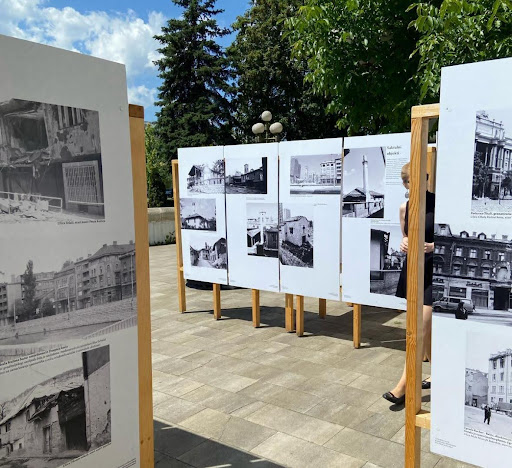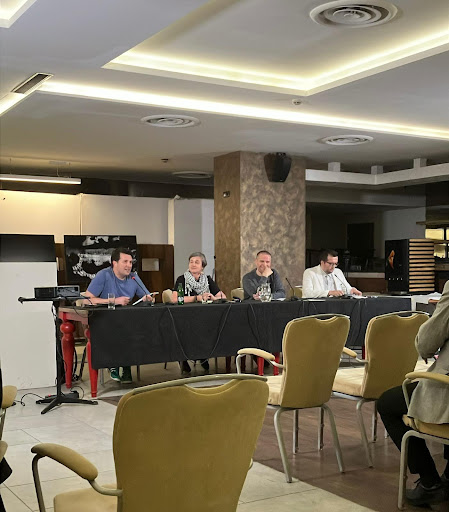
During the first week of June, the ninth annual History Fest Sarajevo (HFS), organized and primarily moderated by Husnija Kamberović, a history professor at the University of Sarajevo and president of the Udruženje za modernu historiju (UMHIS), in collaboration with various national and international institutions, was held at the Hotel Holiday. Here, historians from the region and all over Europe come together to discuss current issues and developments in the region. This year’s topics were shaped specifically by the 80th anniversary of the end of World War II and the 30th anniversary of the Srebrenica genocide and the signing of the Dayton Peace Agreement (DPA).
We were very happy as interns at the PCRC to be invited to attend the different panels, lectures, and discussions. These included, amongst others, an introductory lecture by Nevanka Tromp from the University of Amsterdam, and several thought provoking panels.
Kickstarting the HFS, we were introduced to Midhat Poturović’s art exhibition “The Soul of Srebrenica,” highlighting that photographs give additional depth to written or spoken words. Nevenka Tromp then held her lecture on the crime of genocide, indicating why remembering genocides is important, stressing the “intent to destroy” as a key component of genocide, one built on ideology and which differentiates it from other crimes against humanity. She lastly commended the ICTY for its work, while maintaining that courts cannot write and interpret history themselves, but function as an archive for historians to use retroactively.

An important feature of the HFS was its frequent scholarly book promotions, which presented a diverse array of topics, ranging from violence against women to monuments and memorialization to the role of the Serbian Orthodox Church during the Bosnian war. Additionally, participants had the chance to attend workshops for PhD students, as well as wander around two other art exhibitions opened in the context of the HFS.
Other highlights of the HFS included a panel discussion with Dragan Popović, Country Consultant for Serbia at the European Endowment for Democracy (EED) on the historiographic approaches to Srebrenica in Serbia and a conversation with members of the war-time Presidency of the Republic of Bosnia and Herzegovina on the DPA. The DPA was further discussed on a panel with former High Representative Valentin Inzko and former principal deputy to the OHR Michael Steiner, who both emphasized the need for strong international intervention in the early post-war stages, regretting however the long international presence in the country.
The last day of the HFS focused primarily on the Second World War, and the legacies of the Partisan movement, showcasing their continued influence on the region even 80 years after the end of WWII.
Attending History Fest Sarajevo revealed to us the critical role Bosnia played—and still plays—within developing our understanding of genocide, the ongoing contention over the past that defines much of Bosnian society today, and the general power historical narratives hold to mold post-conflict peace-building, whether positively or negatively. While history often gets framed as something inherently backward-facing, only relevant in school textbooks and debates between isolated academics, the conference showed the inaccuracy of that attitude. Instead, it frequently shapes our present condition, and by not understanding history, we risk blinding ourselves to an endless reservoir of information that can enrich how we tackle any challenge within our world.
Indeed, as PCRC interns, we have already seen this dynamic emerge around our advocacy, from how memories of the war continue to haunt the institutional partners we collaborate with to the violent scars that inform Sarajevo’s character as we work there. And with so many key anniversaries for Bosnia approaching, grasping their modern resonances remains essential for us to properly advance a culture of tolerance, reconciliation, and human rights inside Bosnia and across the globe.
Authored by: Bekir Hodžić, Antonia Kronsteiner, Philip Piljić (PCRC’s summer 2025 interns)


